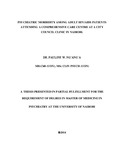| dc.contributor.author | Ng'ang'a, Pauline W | |
| dc.date.accessioned | 2014-12-09T13:59:31Z | |
| dc.date.available | 2014-12-09T13:59:31Z | |
| dc.date.issued | 2014 | |
| dc.identifier.citation | Master of medicine in Psychiatry | en_US |
| dc.identifier.uri | http://hdl.handle.net/11295/76972 | |
| dc.description.abstract | Psychiatric morbidity has been associated with HIV disease since the beginning of the AIDS
epidemic. Despite the fact that low income countries in Africa contribute up to 68% of the
HIV infections worldwide, minimal research has been done in sub-Saharan Africa and in
particular Kenya on the prevalence of various psychiatric morbidities associated with the
infection. Studies indicate that HIV prevalence in Kenya is about 5.6%.
This was a descriptive cross – sectional study to investigate prevalence of psychiatric
morbidity among 245 HIV/AIDS patients attending community based Comprehensive Care
Centre Clinic atKangemi Health Centre.
Ethical approval to conduct the study was obtained from the KNH ethical committee and
participation was voluntary following patient provision of signed informed consent.
Systematic random sampling was used to select the sample and the Mini – International
Neuropsychiatric interview (M.I.N.I plus) was used to assess psychiatric morbidity.
Data analysis was done using the SPSS version 17. The sample characteristics was
summarized using descriptive statistics including mean (SD) for continuous variables and
frequency distribution for categorical variables. Inferential analysis based on the chi squared
test was used to examine associations between psychiatric morbidity in HIV and patient
demographic and socio-economic attributes and health status.
The mean age of the patients was 37.3 years (SD 9.2) with an age range from 19 to 70 years.
Three-quarters (75.9%) of the patients were female.The median duration of HIV illness was 5
years (IQR 3 to 8) and among the 216 patients with recent CD4 counts, 64.4% had counts
less than 500 cells per mm3. The prevalence of psychiatric morbidity was 71.4% (175 out of
254). The leading psychiatric illnesses were: major depressive disorder (32.2%), suicidality
(19.4%), PTSD (18.4%), dysthymia (17.6%) and obsessive compulsive disorder (17.6%).Out
of 175 patients with psychiatric illnesses 71(40.6%) were diagnosed with a single psychiatric
morbidity and the remaining had at least two psychiatric co morbidities.
After multivariable logistic regression analysisdepression was significantly associated with
patientswho had monthly incomes oflessthan Kshs 3000 compared to patients earning
morethan Kshs 3000 per month (OR = 0.56, 95% CI 0.33-0.96). A separate logistic
regressionanalysis showed that employment (OR = 0.39, 95% CI 0.19-0.82) and marital status (OR = 0.39, 95% CI 0.16-0.91) were negatively significantly associated with
suicidality after adjusting for the effect of monthly income.
In conclusion, patients with HIV/AIDS receiving follow up care in Kenya experience
considerable psychiatric morbidity and may benefit from more psychological counseling and
psychiatric assessment and treatment to ensure complete mental wellbeing. In the long-term
screening HIV/AIDS patients for psychiatric morbidity and integrating psychiatric services
into routine care of HIV/AIDS patients will help address the highlighted problem. | en_US |
| dc.language.iso | en | en_US |
| dc.publisher | University of Nairobi | en_US |
| dc.title | Psychiatric morbidity among adult HIV/AIDS patients attending a comprehensive care centre at a city Council clinic in Nairobi | en_US |
| dc.type | Thesis | en_US |
| dc.description.department | a
Department of Psychiatry, University of Nairobi, ; bDepartment of Mental Health, School of Medicine,
Moi University, Eldoret, Kenya | |
| dc.type.material | en_US | en_US |

